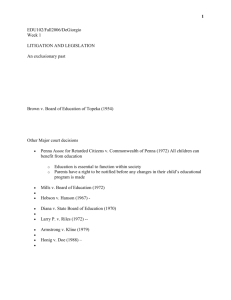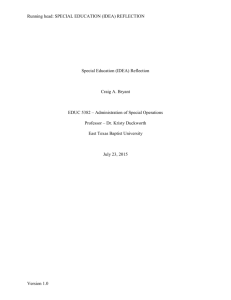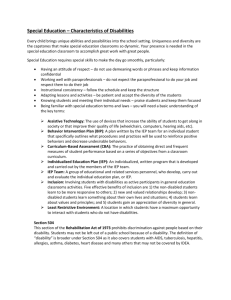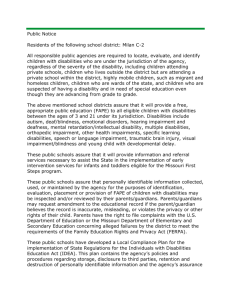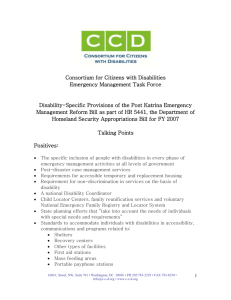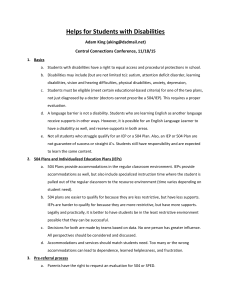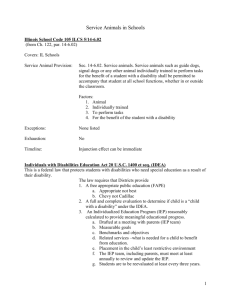ORGANIZATIONS:
advertisement
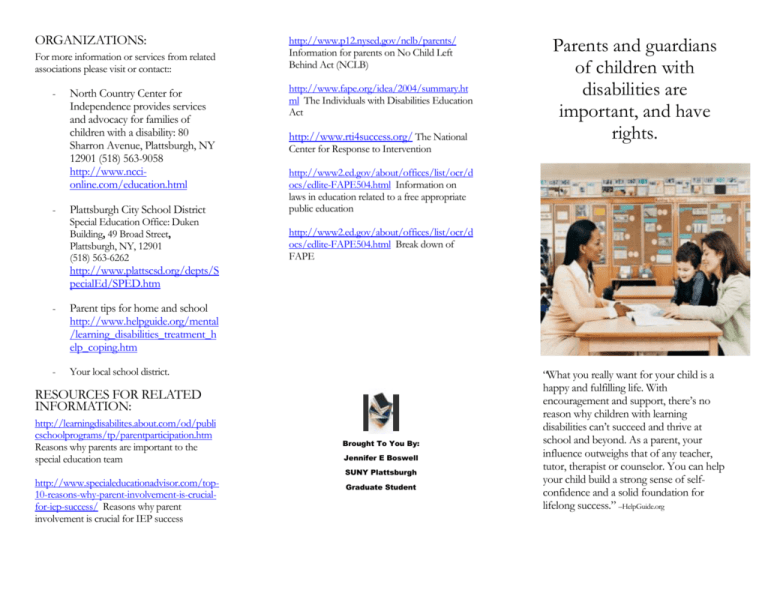
ORGANIZATIONS: For more information or services from related associations please visit or contact:: - - North Country Center for Independence provides services and advocacy for families of children with a disability: 80 Sharron Avenue, Plattsburgh, NY 12901 (518) 563-9058 http://www.nccionline.com/education.html Plattsburgh City School District Special Education Office: Duken Building, 49 Broad Street, Plattsburgh, NY, 12901 (518) 563-6262 http://www.p12.nysed.gov/nclb/parents/ Information for parents on No Child Left Behind Act (NCLB) http://www.fape.org/idea/2004/summary.ht ml The Individuals with Disabilities Education Act http://www.rti4success.org/ The National Center for Response to Intervention Parents and guardians of children with disabilities are important, and have rights. http://www2.ed.gov/about/offices/list/ocr/d ocs/edlite-FAPE504.html Information on laws in education related to a free appropriate public education http://www2.ed.gov/about/offices/list/ocr/d ocs/edlite-FAPE504.html Break down of FAPE http://www.plattscsd.org/depts/S pecialEd/SPED.htm - Parent tips for home and school http://www.helpguide.org/mental /learning_disabilities_treatment_h elp_coping.htm - Your local school district. RESOURCES FOR RELATED INFORMATION: http://learningdisabilites.about.com/od/publi cschoolprograms/tp/parentparticipation.htm Reasons why parents are important to the special education team Brought To You By: Jennifer E Boswell SUNY Plattsburgh http://www.specialeducationadvisor.com/top10-reasons-why-parent-involvement-is-crucialfor-iep-success/ Reasons why parent involvement is crucial for IEP success Graduate Student “What you really want for your child is a happy and fulfilling life. With encouragement and support, there’s no reason why children with learning disabilities can’t succeed and thrive at school and beyond. As a parent, your influence outweighs that of any teacher, tutor, therapist or counselor. You can help your child build a strong sense of selfconfidence and a solid foundation for lifelong success.” –HelpGuide.org WHO DESERVES AN EDUCATION? Everyone and a Free Appropriate Public Education at that! No matter what disability your child has or how severe it is, your child will receive an education within your district at no cost to you. As a student, your child deserves to have an education that helps him or her succeed in school to the best of his or her ability. This is under the Individuals with Disabilities Education Act, (IDEA) which is an act that guarantees education for students with disabilities and list details of the regulations under Free Appropriate Public Education. (FAPE)http://www2.ed.gov/about/offices/list/ocr/504faq.h tml Students with and without a disability deserve to be educated in the way that suits them best as an individual learner. LEARNING FOR ALL: All students learn differently through many different methods and in various settings. All students deserve the right to learn in a place that they not only feel comfortable in but will allow them to grow and learn as an individual as well as a part of the school and community. This is considered under law as being educated in the least restrictive environment. (LRE) NO CHILD LEFT BEHIND: NCLB is a federal law that gears towards improving education for all children, with and without disabilities. This law holds teachers and other school staff responsible for the success of the students. This gives parents more choices and promotes teachers to use research based teaching strategies that are proven to work. RESPONSE TO INTERVENTION: With using the least restrictive environment in schools and research based methods, schools have adopted the three tiered approach in education known as RTI, Response to Intervention. In the first tier students receive a whole group or class education in the general education setting. At this level different research based strategies are used for all students to experience and engage with. Tier two is still in the general education setting but in small more intensive groups where the research methods used are tailored more to the specific people in the group. Tier three is the most intensive education setting, where one on one instruction occurs. This all occurs in the general education setting and after these tiers have been worked through then special education services will occur. This tiered system allows students to receive the education they need at a level that will suit them best. COMMUNICATION IS KEY: If you have any questions or concerns about whether or not your child is receiving an appropriate education contact your child’s teacher first. Your child’s teacher should know how your child learns and is progressing in their studies. Have a meeting with them to discuss progress and the laws that protect you and your child. Also meet with other parents of students in the school to discuss events and the curriculum in the school. When parents join together you can help the school and the school can help you more too. Through communicating together you can work with your child’s teacher and school toward a common goal, helping your child learn and grow. YOU’RE ON THE TEAM: As a parent of a child with a disability you are a part of the IEP (Individualized Education Plan) team. This team consists of different people from the school, you and a parent advocate to discuss your child’s strengths, goals, progress and planning for the future. IEP meetings are held to discuss all of this and involve you in your child’s education journey. Also if you want to meet with team to discuss progress do not be afraid to ask! YOU ARE IMPORTANT: While there are many different people in your child’s life at school no one knows your child, as well as you do. We want to work with you toward having your child be an active participant in their learning experiences. You are important to your child and the school as well. Use your rights to get what you feel is right for your child and don’t be afraid to ask questions. Communication between home and school will help further your child’s progress all around!


